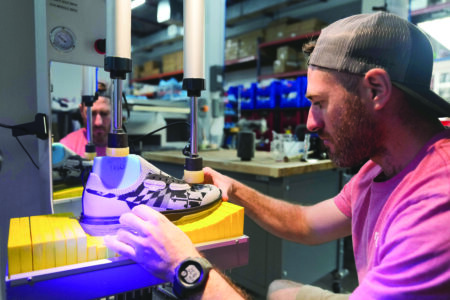Vaping, anxiety the focus of TCAPS group
By Brendan Quealy
AP Member Exchange
TRAVERSE CITY — Going beyond the academic needs of a student and addressing the child’s social and emotional well-being has become a priority to educators across the country.
Traverse City Area Public Schools is prioritizing that as well after forming a behavior committee during the summer break.
District officials met with social workers, law enforcement, special education teachers, curriculum leaders, principals and a physician on July 10 to focus on how student behavioral issues interfere with teaching and learning.
“(Students) are coming to us more in crisis than we’ve ever seen before,” TCAPS Superintendent Ann Cardon said.
Members of the committee decided at the July 31 meeting to focus on three areas — substance abuse, specifically vaping; disrespectful behavior and anxiety as well as depression as it relates to truancy and high absentee rates.
Jame McCall, TCAPS associate superintendent, said these issues loomed large during the final few months of the last school year, forcing their hand to put an action plan in place.
Pinpointing the root cause and balancing punishment with education will be key, McCall said.
“There will be a consequence for the behavior, but what are are we doing to teach them a different replacement behavior or why it’s not good for them?” she said.
McCall said that if a student is caught either vaping or with vaping paraphernalia, the plan is to pair a punishment — such as taking away driving and parking privileges — with a restorative measure — such as online education about the dangers of vaping.
Communication with parents, guardians and other family members is also paramount to the success of this program, McCall said.
TCAPS Board of Education Vice President Doris Ellery said continuing the services once the school day ends and the child arrives at home is where the biggest changes can happen.
“You can do a lot with a child, but if it stops at the school doors and doesn’t follow through, that’s going to be a hard bridge to cross,” Ellery said.
McCall said many families, including several at East Middle School last fall, have acknowledged their child’s behavior is an issue, but they simply do not have the answers.
“We have families who are asking for help,” she said. “Our goal is going to be to figure out what they’re supposed to do and help them do that.”
TCAPS recently hired a district social worker to focus on an overall behavioral picture of what is happening within the district while partnering with school social workers who are working one-on-one with the students.
“The reduction in community mental health services has certainly had an impact on our families,” McCall said. “If we have a student who needs services, it can sometimes be a six-month wait to get them in to a child psychiatrist.”
Christine Guitar, TCAPS executive director of communications, is working on delivering that message to the greater community while making them aware of the services the district can offer.
When speaking with parents about issues with their child, the goal is to avoid shame and blame, Guitar said.
“This is something everyone is dealing with, so how we provide resources in a way that parents are accessing them and are able to use them and don’t feel like there’s something wrong with their family or their child?” Guitar said.
“We’ve got a nationwide problem related to students and anxiety, how locally are we going to address that. That’s what’s going to shape our communities. Our response to it.”
Disrespectful behavior will be the toughest to tackle, McCall said. District officials drew the proverbial line in the sand last year when it came to students yelling at or being abusive toward teachers or other staff members. McCall said they saw an increase in suspensions early in the year and then experienced a swift drop.
“It’s just like working with your child at home,” she said. “You set the boundary. You get the tantrum. Then, hopefully, you get compliance.”
Members of the committee will continue work throughout the school year to address the students’ social and emotional issues with the hopes of expansion in the future.
“We have to approach it differently,” McCall said. “We have to find out why. It’s really about diving deep into their emotional state and supporting our kids.”





